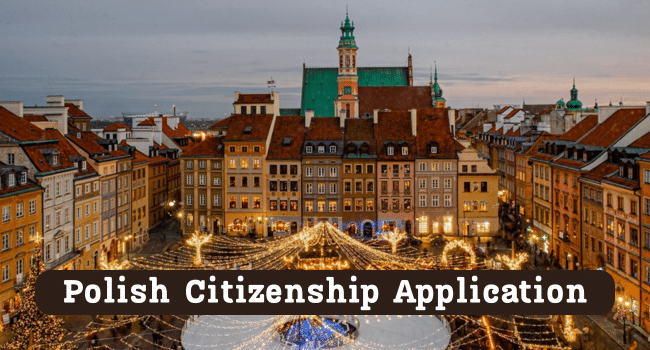Table of Contents
Applying for Polish citizenship, especially through descent, can seem like a daunting journey through a maze of paperwork and regulations. While it’s true that the process requires diligence and attention to detail, it’s far from impossible. With the right approach and a clear understanding of what’s expected, you can significantly streamline your application and increase your chances of success.
Here are some essential tips to help you navigate the bureaucracy and ensure a smoother Polish citizenship application.
1. Understand the Basis of Your Claim
The most common path to Polish citizenship for individuals outside of Poland is through descent (by blood). This means demonstrating an unbroken line of Polish citizenship from an ancestor. Before you even gather documents, you need to clearly understand who your Polish ancestor was, when they left Poland, and how their Polish citizenship might have been maintained or lost according to historical Polish law.
- Key takeaway: Don’t just assume; thoroughly research your family history to establish a plausible claim before you begin the official process.
2. Gather Comprehensive Documentation
The success of your application hinges on the quality and completeness of your supporting documents. This typically includes:
- Birth, marriage, and death certificates for all ancestors in the lineage, proving the continuous family connection.
- Proof of Polish citizenship of your ancestor (e.g., old Polish passports, identity cards, military records, electoral rolls, census records).
- Documents related to your ancestor’s emigration and subsequent life in their new country (e.g., naturalization papers, foreign passports, records of military service). These are crucial for proving that they did not lose Polish citizenship.
- Your personal documents (birth certificate, marriage certificate, current passport, etc.).
Tips for documentation:
- Authenticity is key: All documents must be original or certified copies.
- Translations: Documents not in Polish will need certified translations by a sworn (certified) translator in Poland.
- Apostille/Legalization: Depending on the country of origin, foreign documents may need an Apostille or diplomatic legalization. Check specific requirements for your country.
- Anticipate requests: Often, the Polish authorities will request additional documents or clarifications. Be prepared for this and respond promptly.
3. Be Meticulous with Details and Consistency
Bureaucracy thrives on precision. Any discrepancies in names, dates, or places across various documents can cause significant delays or even rejection.
- Consistency: Ensure names, spellings, and dates are consistent across all records. If there are variations (e.g., an anglicized name), you may need to provide supporting evidence (like an affidavit) explaining the discrepancy.
- Full names: Always use full names as they appear on official documents.
- Accuracy: Double-check every detail before submitting. One small error can lead to a long correction process.
4. Understand the Role of Apostille and Certified Translations
These two elements are frequent sources of confusion and delay for applicants.
- Apostille: For documents issued in countries that are signatories to the Hague Apostille Convention, an Apostille stamp is sufficient to authenticate the document for use in Poland. If your country is not a signatory, documents will require legalization through diplomatic channels (usually via the Polish embassy/consulate).
- Certified Translations: You cannot simply use any translator. For official use in Poland, translations of foreign documents must be done by a sworn translator (tłumacz przysięgły) registered in Poland. This ensures the legal validity of the translation.
5. Consider Professional Assistance for a Smoother Process
While it’s possible to manage the application yourself, the complexity of Polish administrative law, historical nuances, and document requirements often makes professional assistance invaluable.
- Expert knowledge: Specialists in Polish citizenship law are well-versed in the historical context of citizenship legislation, potential pitfalls, and the exact requirements of Polish authorities.
- Document acquisition: They can assist in locating hard-to-find archival documents in Poland or other countries.
- Liaison: A professional can act as your representative in Poland, communicating directly with government offices, which can be particularly helpful if you don’t speak Polish.
- Error prevention: Their expertise can help you avoid common mistakes that lead to delays or rejection.
If you’re wondering how to get Polish citizenship and need expert guidance through every step of the process, consider consulting specialists who can streamline your journey. Their knowledge can save you significant time and effort.
6. Be Patient and Persistent
The Polish citizenship application process is not usually a quick one. It can take months, or in some complex cases, even a couple of years, for a decision to be made by the relevant authorities (often the provincial governors or the Ministry of Interior and Administration).
- Set realistic expectations: Understand that delays can occur due to the volume of applications or the need for extensive archival research.
- Follow up politely: If you don’t hear back within the expected timeframe, a polite inquiry through your representative or directly to the office can be appropriate.
By approaching your Polish citizenship application with thorough preparation, meticulous attention to detail, and a clear understanding of the bureaucratic landscape, you can significantly increase your chances of a successful and smooth process. It’s a significant undertaking, but the rewards of an EU passport and a connection to your heritage are undoubtedly worth the effort.
